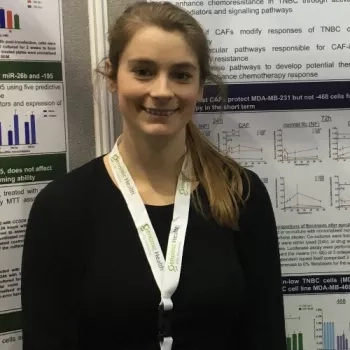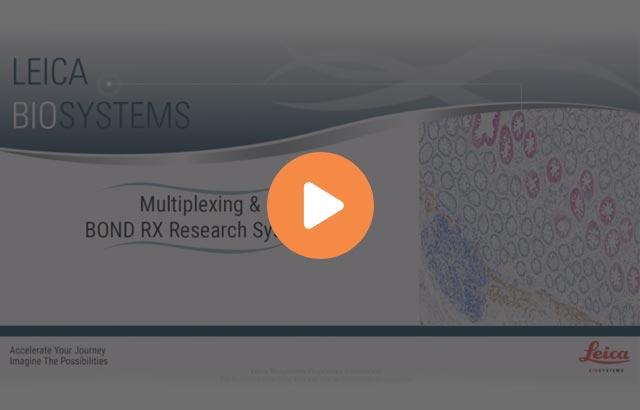Characterizing the Tumor Microenvironment through Immunophenotyping and Spatial Biology using Ultivue 8-plex Immunofluorescence Technology on the BOND RX Research Stainer

Multiplex immunofluorescence (mIF) assays offer the advantage of preserving the architectural features of the tumor microenvironment and revealing the spatial relationships between tumor cells and immune cells that are present.
Using custom-designed Ultivue 8-plex kits on the BOND RX system by Leica Biosystems, it enables the definition of the T cell phenotypes spatially and quantitively. This is especially important in treatment response monitoring and TME infiltration assessment in immunotherapy clinical programs at Adaptimmune where next generation SPEAR-T cell have been developed using Adaptimmune’s affinity-enhanced tumor antigen targeting TCR technology.
For Research Use Only. Not for use in diagnostic procedures.
About the presenter

Robyn Broad completed her undergraduate degree in Biochemistry at the University of Manchester, UK in 2014. During her undergraduate degree, she had the opportunity of undertaking a placement year, which she completed at MedImmune, Cambridge UK. During her time at MedImmune, Robyn worked in both the phage display team and histology group, producing, and identifying IHC compatible antibodies for targets where commercial antibodies were not currently available. Following completion of her undergraduate degree, Robyn received her MSc in Cancer Research and Molecular Biomedicine again from the University of Manchester and received her PhD from the School of Medicine at the University of Leeds in 2019, where she investigated the role of cancer-associated fibroblasts on chemoresistance in triple negative breast cancer. Since 2018, Robyn has worked at Adaptimmune (Abingdon, UK), firstly within the Target Validation team identifying new targets to add to the Adaptimmune pipeline. Having cross trained within the Translational team during her time in Target Validation, Robyn moved over to the Tumor profiling team with Translational Sciences in January 2020. As part of the tumor profiling team, Robyn is responsible for analyzing tumor biopsies from Adaptimmune’s clinical trials, and detecting and quantifying the presence of Adaptimmune's SPEAR T-cells. In addition to this, the team is also tasked with understanding the tumor microenvironment within tumor biopsies. This is done through the use of multiplex staining and imaging technologies with spatial immunophenotyping alongside genomics and transcriptomics profiling.
Related Content
Die Inhalte des Knowledge Pathway von Leica Biosystems unterliegen den Nutzungsbedingungen der Website von Leica Biosystems, die hier eingesehen werden können: Rechtlicher Hinweis. Der Inhalt, einschließlich der Webinare, Schulungspräsentationen und ähnlicher Materialien, soll allgemeine Informationen zu bestimmten Themen liefern, die für medizinische Fachkräfte von Interesse sind. Er soll explizit nicht der medizinischen, behördlichen oder rechtlichen Beratung dienen und kann diese auch nicht ersetzen. Die Ansichten und Meinungen, die in Inhalten Dritter zum Ausdruck gebracht werden, spiegeln die persönlichen Auffassungen der Sprecher/Autoren wider und decken sich nicht notwendigerweise mit denen von Leica Biosystems, seinen Mitarbeitern oder Vertretern. Jegliche in den Inhalten enthaltene Links, die auf Quellen oder Inhalte Dritter verweisen, werden lediglich aus Gründen Ihrer Annehmlichkeit zur Verfügung gestellt.
Vor dem Gebrauch sollten die Produktinformationen, Beilagen und Bedienungsanleitungen der jeweiligen Medikamente und Geräte konsultiert werden.
Copyright © 2025 Leica Biosystems division of Leica Microsystems, Inc. and its Leica Biosystems affiliates. All rights reserved. LEICA and the Leica Logo are registered trademarks of Leica Microsystems IR GmbH.

